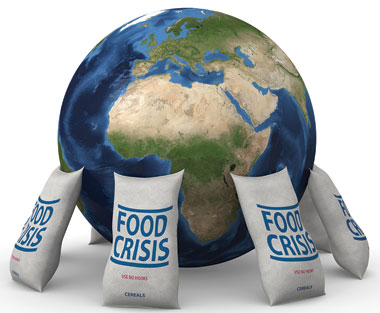I'll bet you've never been to a Weight Watchers meeting, but I've been to lots of them. While sitting in those meetings, I've often been struck by the fact that so many people are trying desperately to lose weight, while multitudes of others throughout the world are trying desperately to feed themselves and their families.
Men and women—myself included—bemoan the extra pounds they bear as a result of overindulgence. In my life, food is everywhere, often in excessive portions. I have to exercise restraint. But around the globe, not only are stomachs rumbling, people are dying for want of it. And I'm told it's not a peaceful death.
Starvation causes the organs to fail, one by one. I really can't even imagine what that feels like. To be honest, I don't even let my stomach rumble for too long before I meet its demands.
Gluttony is one of the seven deadly sins. But for some reason, we tend to wink at it. Hey, it's not something vile, like drinking alcohol (she said, with tongue in cheek)! What does our gluttony cost others? Do we live lives of justice and righteousness if we pad our bellies while others starve?
As with so many things that involve resources, I can't figure out what is fair to expect of myself. I believe there should be restriction on what my family and I consume, and that surplus funds from that limitation should be dedicated to feeding the hungry. But how do I decide those limitations? It would be hard to function in my world if I limited myself to the minimum amount of food it takes to survive. How would I negotiate parties and various functions—how would I live in North America? Also, there are many biblical references to feasting and celebrating God's provision. So, is it wrong to indulge occasionally? How do we appreciate and enjoy our abundant resources, but act in a manner that is mindful of those in need?
Amy
Dear Amy
I suspect that if the average North American peeked at what we're writing, they might say, “Lighten up, guys! There's enough guilt in the world already. Just let me eat.” Maybe there's something to be said about not being too serious. As you say, eating does often seem to be about celebrating and having a good time.
But first, I think you are right to be heartsick about the lack of food in too many places in the world. You and I have the luxury of deliberating the ethics of what to eat; for millions—or is it hundreds of millions?—there's nothing to deliberate.
Reliable sources say that there is actually enough food in the world to give everyone a decent diet. It's the distribution that bedevils us
I'm no expert on these things, so I decided to check some statistics. Drawing on the 2004 UN Human Development Report, www.worldmapper.org (which does a terrific job graphing the dry statistics, by the way) says, “Over the 10-year period from 1990 to 2000, the number of people in the world that lived on an inadequate amount of food increased from 840 million to 858 million. Of all the people living in Central Africa, over 60 percent are undernourished. The Democratic Republic of Congo has the highest levels of undernourishment: three in every four people.” That's close to 40 million people on the edge of starvation. More than the total population of Canada! And each year, over 10,000 of them die.
This is simply not good enough. I hear the prophet Amos thundering in my ear, “Alas for those who lie on beds of ivory, and lounge on their couches, and eat lambs from the flock, and calves from the stall … but are not grieved over the ruin of Joseph!” (Amos 6:4-6 NRSV).
Actually, I hear my mother even more loudly, telling me to eat up my peas or lima beans or whatever it was on my plate that I didn't like as kid because “there are hungry children in China.” Did your mother say things like that, Amy? And did you ever have the cheek to say, “Well then, mail it to them!”? I did, which was just childish. But now that I am a man, I want to put away childish things.
 I still think one of the biggest hurdles—after our conscience has been sensitized to care about empty stomachs elsewhere—is to know how the resources get from our plenty to their need. Reliable sources say that there is actually enough food in the world to give everyone a decent diet. It's the distribution that bedevils us. If we simply eat less, it doesn't mean that infants and mothers in Congo or rural China will eat more. Amartya Sen won the Nobel Prize in economics for his book Poverty and Famines. He shows that it is unjust political systems, not empty granaries, that have caused mass starvation in the modern world.
I still think one of the biggest hurdles—after our conscience has been sensitized to care about empty stomachs elsewhere—is to know how the resources get from our plenty to their need. Reliable sources say that there is actually enough food in the world to give everyone a decent diet. It's the distribution that bedevils us. If we simply eat less, it doesn't mean that infants and mothers in Congo or rural China will eat more. Amartya Sen won the Nobel Prize in economics for his book Poverty and Famines. He shows that it is unjust political systems, not empty granaries, that have caused mass starvation in the modern world.
If Sen is right—and who am I to doubt it?—my fear is that people in the “developed world” will just shrug and say, “Too bad, but there's not much we can do until they sort out their political messes.” Sitting at National Headquarters in Washington, D.C., you are pretty well connected with some of the Army's international development experts. They know the hurdles and the opportunities better than we do, and may have some practical advice for us.
I talked about this with Michael, a colleague at The Salvation Army's William and Catherine Booth College, who used to work for a global aid agency. Michael says, “While guilt doesn't feed the hungry, action may help. Let's search for ways to build food security in the places where it's most needed.” He also says, “Even in countries where they have so little, they will sacrifice to have a feast. Whole villages will be fed during an Indian wedding.”
That brings me back to your comment about the place of eating in the Bible. Is it ever just about the food? In fact, when the Apostle Paul wrote the Corinthians about “the Lord's supper,” he told people to stay home if they had come just for the food (see 1 Corinthians 11). Sitting at the table as a church was supposed to be about so much more. It was for receiving and extending hospitality—making room for others, cultivating relationships of healthy interdependence (someone called it “re-membering” time), retelling the story of Jesus and remembering that we wouldn't be here without him.
Salvationists have been taught that every meal could be a means of grace. When I examine how our culture approaches eating these days, I think the simple act of eating together may be a way of showing we take Christian ethics seriously. It may also be a way of discovering that God gives good gifts when we do so. A large study in St. Paul, Minnesota, in 1998-99, showed that a quarter of teenagers had a family meal no more than twice a week. The researchers found that “frequency of family meals was inversely associated with tobacco, alcohol and marijuana use; low grade point average; depressive symptoms; and suicide involvement.” In ordinary English, teens who regularly ate with their families were likely to be physically and psychologically healthier.
Does this resonate with your experience?
Jim
Dear Jim,
Funny you should mention the St. Paul study. My husband, sons and I were at the dinner table the other night when Wes, almost 13, referenced something he'd heard: “Did you know that kids who have dinner with their parents are more likely to know that their parents are proud of them?”
These two strands—the value of eating together and concern for world hunger— can be wound together, I think. For our family, mealtime has proven to be an excellent time to discuss global poverty. Because we have dinner together pretty much every night (which can mean the Herculean task of accommodating some wild schedules), most of our family chats take place around the table. We often use the opportunity to educate our children about world concerns—especially poverty.
We also use mealtime to discuss our little family projects to address hunger and poverty. For example, we have a family “tax” of five percent on almost all purchases made by anyone in our family. That money is used to buy chickens and goats for families in underdeveloped countries. As we eat our fill, we discuss which animal we want to buy next, and how close we are to having enough money. There is something that makes sense about talking these things over while nourishing your own body. As you put your fork in your mouth, you get the connection. Or should I say, you get the disconnection: I have what I need; they don't.
Distribution is a grave problem. But it is not so large a problem that we need to throw our hands in the air. According to my friend, Bram, in the Salvation Army World Services Office, the Army is actively increasing food security in underdeveloped nations by training farmers in better agricultural practices as well as animal husbandry. Let's not forget the good work done through our annual world services offering (Partners in Mission in Canada and Bermuda).
I'm not one to say that if we can't help everyone we shouldn't help anyone. You and I would agree on that, I suspect. So, while we might not be able to save the world today, could we re-appropriate that $4 we were going to spend at Starbucks? Could we even cut down the amount of food we consume and give that money as a special offering at world services time? If we really care, we'll give up more than the luxuries. We'll make some sacrifice. You and I and our Salvationist friends can make a difference in the world. And, based on Matthew 25:31-46, I think that would please God.
Amy

 In this Talking It Over series, Dr. James Read, Executive Director of The Salvation Army Ethics Centre in Winnipeg, and Captain Amy Reardon, Editor of Young Salvationist, U.S.A. National Headquarters, dialogue about moral and ethical issues. Click here to read more debates in the Talking It Over series.
In this Talking It Over series, Dr. James Read, Executive Director of The Salvation Army Ethics Centre in Winnipeg, and Captain Amy Reardon, Editor of Young Salvationist, U.S.A. National Headquarters, dialogue about moral and ethical issues. Click here to read more debates in the Talking It Over series.









Leave a Comment